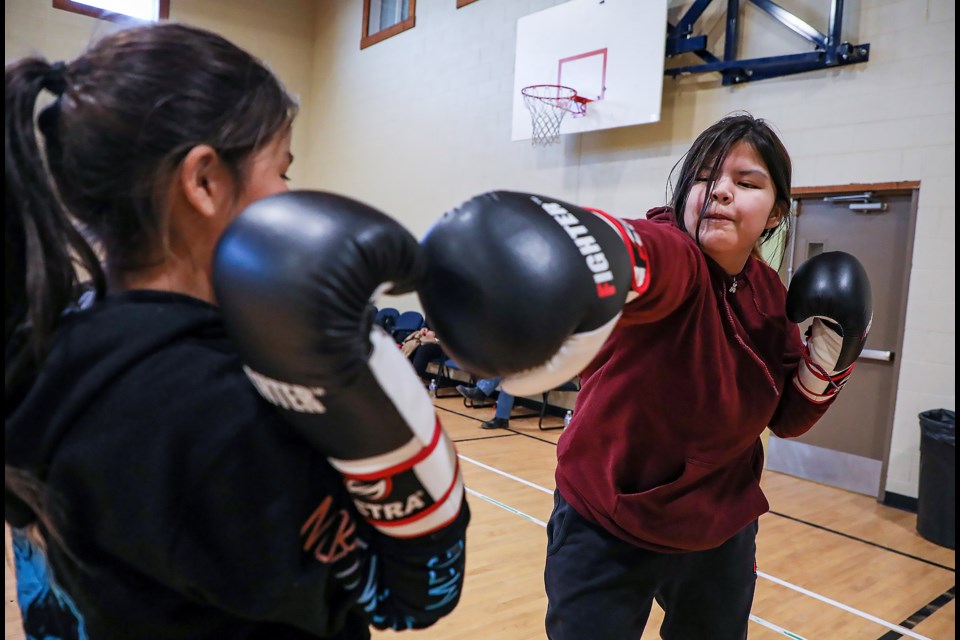ÎYÂRHE NAKODA – Paws are flying left and right in Mînî Thnî.
Îyârhe Nakoda First Nation’s premier boxing club, named after and supported by the Bearspaw band, is only in its first few months of operation and there are already talks of tournaments, champions, trips to nearby Indigenous battlegrounds and bestowing boxers with their Stoney names.
“Boxing is a sport where you can draw a lot of pride, a lot of identity,” said Trevor Wesley, Bearspaw Boxing Club coordinator. “It gives you confidence is what it does, but it also teaches you to pick your battles.”
Wesley, an amateur boxer from 1991-94, grew up watching his father, George Piché, in the sport. He said it’s part of the reason he found boxing, but not why he stayed.
“The benefits I got from it as a young man ... like any other young person facing dilemmas or challenges in life, it was a place where I felt good self-esteem,” he said.
What started as an act to try and unleash some stress and frustration in a healthy way, quickly turned into a respect for the sport and a drive to become better.
Although he no longer boxes, Wesley said he hopes to motivate youth in the community to find their stride the way he did at times when it may be needed most.
Training, which runs twice a week in U15 and adult groups, kicked off earlier this year. Many of the same people return for most or every session, but there's often new faces, too.
Coaching the club is Warren Grenier, general manager of Calgary-based Southpaw Boxing Gym.
Grenier’s goal with the Mînî Thnî club is to not only bring the sport to the community, but to build it up to a point where it creates more high-level Indigenous competitors.
“It takes a lot of grit, a lot of determination, a lot of time and effort, learning how to train yourself and feed yourself, putting yourself to bed early and getting up early,” he said. “But we want to create some role models in the sport that may eventually want to help run this club and be a part of passing that on.”
The club trains new boxers beginning at a very basic level – learning how to stand, where to position their body and how to wrap their hands.
The club has acquired bag gloves, handbags, standing boxing bags and a few other pieces of equipment, but still needs training mats to lay on the floor of the Bearspaw Youth Centre – where they practice – before any sparring can begin.
Grenier said this is the first time he or the Calgary gym have been asked to help carry out rural programming.
“Programs like this are needed in rural communities, like a lot,” he said. “I’d much rather be doing something like this knowing that it’s fulfilling a need than training a bunch of people from the city who have access to everything, this is much more rewarding.”
Operations manager for Bearspaw First Nation, Les Arcand, said the club is supported by chief and council as part of leadership’s efforts to promote healthy lifestyles in the community. Despite its name, the club is also open to Goodstoney and Chiniki band members.
“Chief and council are 100 per cent behind this, they want to see more youth activities being driven through this facility,” he said.
“I think it’s also a great opportunity for youth to let off a little steam in a healthy, positive manner, rather than doing something that might not be as healthy or acceptable to meet that end.”
Franklin Ear, who lives in Mînî Thnî, came out for the club’s Thursday meet on March 30. As someone who enjoyed boxing before, Ear said it's been great to able to see others find joy in it, too.
“I do hope that this can kind of draw more people out from the community to come by and try putting on a pair of gloves,” he said. “It doesn’t have to be a competition, it can just be for exercise or to get out. It’s a great way to do that.”
In the spring, Wesley hopes to bring the boxers to an unmarked Indigenous battleground near Eden Valley as part of their journey with the club, but also as a lesson in identity. Îyârhe Nakoda culture reveres its warriors and such sites are considered sacred.
Wesley said they’re also thinking about hosting a Stoney naming ceremony in August to honour the Nation members involved, but further consultation with family members is needed as names are typically gifted by family or in specific ceremony.
“It’s been amazing to see some of the hard work and dedication happening with this club, even though it’s still early, it would be nice to able to honour that in some way,” he said.



